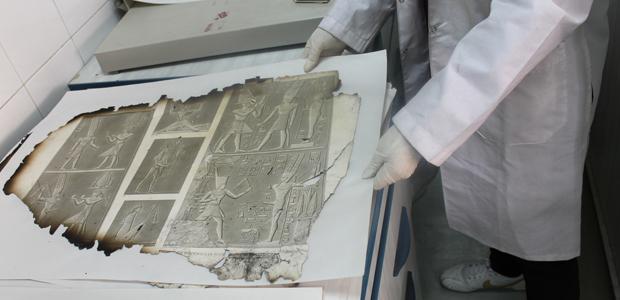A heroic effort underway in Egypt to save damaged books, manuscripts
A researcher at the National Library displays the burned pages of the Description D’Egypt. (Photo by Noel King.)
Clashes between pro-democracy protesters and security forces shook downtown Cairo for nearly two weeks in December.
The clashes reportedly began after a pro-democracy protester was beaten by the police. In the ensuing chaos, more than a dozen people died. But they weren’t the only casualties.
Egypt’s Scientific Institute, formed in 1798 by Napoleon Bonaparte, was burned and thousands of rare books were destroyed.
In the basement of the Egyptian National Library, a remarkable rescue effort is underway. Teams of researchers, book restorers and volunteers are attempting to save 193,000 rare manuscripts, books and scientific journals.
The books are in a sad state. Burned by fire and then drenched when desperate firefighters tried to extinguish the flames.
Magdi Montassir is vacuum-packing the wet books. He gently places each book into a plastic bag, then puts the book into a machine that looks a little like a photocopier.
He closes the lid, turns a dial and the bag fills up with air. Then, every bit of air is pushed out with a sharp whoosh.
“The machine is sealing the bag,” Montassir said. “Empty out oxygen, nitrogen. Now, close the machine. Now the machine works.”
Without oxygen, bacteria and fungus can’t grow on the wet pages. The vacuum-packed books are stacked haphazardly in a basement hallway. The sight of thousands of rare volumes cascading in piles in a dimly-lit hallway is shocking.
But there’s just no other place for them.
The fastest and easiest way to dry them is simply to take them up to the roof of the building and let the Egyptian sun beat down on them. Up on the roof of the Egyptian National Archives, even more books are drying out in the sun. They’re lying on sheets of newspaper, held down by stones.
Back downstairs, a young man in a white lab coat is slumped at a table aiming a neon blue hair dryer at a damp scientific journal.
Behind him is the crown jewel of Egypt’s collection: an original copy of the Description D’Egypt, a description of Egyptian customs, art, culture and history that dates back to Napoleon’s 1798 campaign.
The pages are burnt at the edges. Otherwise, the book is in decent shape.
The books are from the Institut D’Egypt, or Egypt’s Scientific Institute. The building was a national treasure that most Egyptians didn’t even know existed.
With no government funding and no digitization of the volumes, historians describe it as a sleepy library that attracted researchers with lots of time and patience on their hands.
Whoever started the fire during the height of clashes between Egyptian protesters and security forces in December, probably didn’t even know what he was destroying.
“We are a cultured people,” said Zain El Din Mohammed Abdel Hati, chairman of the Egyptian National Library.
He’s furious with the protesters who burned the Institute.
“I think who did this is the enemy of the Egyptian culture. In this moment, we have a lot of enemies,” he said.
Abdel Hati has spent a good portion of the library’s budget on the recovery effort. He is running out of money. And the rescuers are tired. Their nerves are frayed. Many of them are heartbroken about the loss.
Researcher Mohammed Hassan kneels in a basement room where fans have been turned on full-blast to help dry the books. The fans are pointed up at the ceiling to avoid disturbing the ashes and loose pages -all that is left of many books.
He is gently sifting through burnt pages with a gloved hand. Hassan won’t throw away anything though — not even the charred scraps.
It’s impossible to tell which books the scraps came from.
“I need somebody who is specialist in these cases to tell me to throw it away,” Hassan said. “But … I must keep it safe.”
Until the experts can decide which books can be saved and which can’t, volunteers will continue working for hours at a stretch — with hair dryers and shrink wrap machines — trying to salvage history, one page at a time.
